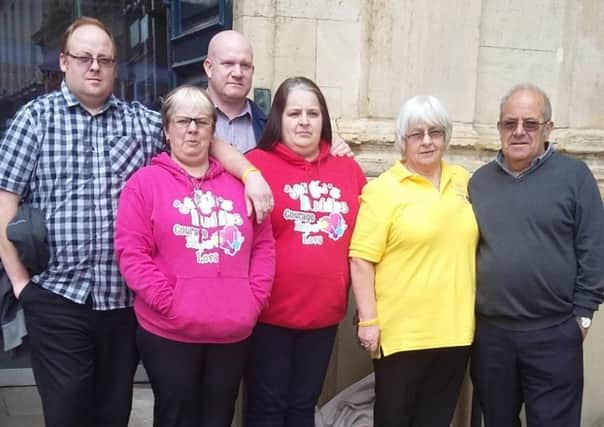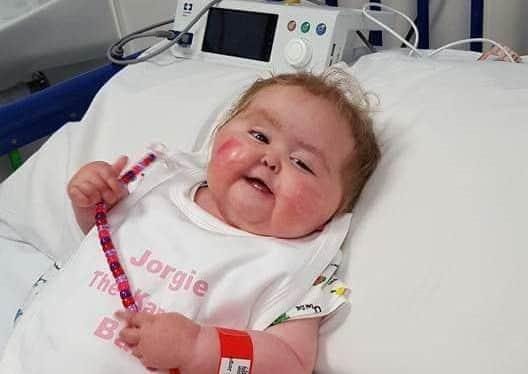Short staffed and too busy: How WAS Jorgie Stanton-Watts ‘neglected’ under the care of medical staff on a children’s ward?


Kettering General Hospital staff took to the stand to talk about how they simply did not have time to carry out basic duties on Skylark Ward during October 2016.
Blood tests were delayed, observations not done and nappies that showed the extent of Jorgie’s fluid output were crucially not weighed for five hours. These were included in five ‘gross failures’ that led to Jorgie’s death from neglect, according to Coroner Philip Barlow.
Advertisement
Hide AdAdvertisement
Hide AdOn the day of Jorgie’s death, October 5, 2016, there were six nurses on shift because one had called in sick at short notice.


There were no nurses available to stand in from the neonatal unit because on that day their department had three ventilated babies.
KGH paediatric and neonatal Matron Donna Mason said that the chances of getting bank cover at very short notice was “slim.”
So, between them, those six nurses had to care for 25 patients - just one child short of a full-to-capacity Skylark ward.
Advertisement
Hide AdAdvertisement
Hide AdOne of those nurses also had to juggle the role of ward coordinator with monitoring her patients.
At 2.30pm one nurse finished her shift, leaving just five nurses on Skylark Ward.
It is no wonder, then, that Jorgie’s mandatory hourly observations were not completed.
Coroner Philip Barlow said that Jorgie, who was just 23-months-old and from Corby, was a ‘high risk patient in a high risk situation’.
Advertisement
Hide AdAdvertisement
Hide AdBut until the evening of October 5, when a blood test finally showed fatal levels of sodium, nurses had not realised the severity of Jorgie’s condition.
The coroner asked Ms Mason whether a high risk patient being looked after on a nursing shortage would ‘add to the risk of the situation.’
“Yes,” replied Ms Mason.
Nurse Tanya Ball, who was nurse in charge of Skylark Ward on October 5, 2016, told the court: “We were short-staffed and we had a few patients who were high demand.
“It was a busy shift.”
Mr Barlow asked her why she didn’t fulfil her duty to go on the 10am ward round - where vital information about patients is passed to consultants and doctors.
Advertisement
Hide AdAdvertisement
Hide Ad“I just didn’t have time to get onto the ward round,” she said.
“I was too busy looking after patients so asked the matron if she could help. As far as I was concerned she was going on the round.”
But the matron did not go on the round so, crucially, vital information about Jorgie’s unsettled night, her restricted feeds and her diarrhoea may not have reached doctors.
Later in the day, Nurse Ball removed a monitor from Jorgie to give to another patient because she said Jorgie was ‘happy, she was playing’ and ‘she didn’t need it’.
Advertisement
Hide AdAdvertisement
Hide AdBut it is perhaps because of Jorgie’s relatively cheerful outward appearance that staff were, according to the coroner, given a ‘false comfort’ which was ‘bound to be compromised by insufficient staff levels’.
Because she was not monitored closely enough, staff were not aware of the septicaemia consuming her body - despite a high Paediatric Early Warning System (Pews) Score - and so Jorgie’s blood test that was ordered in the morning of October was not done until 6pm.
When the blood test was returned from the lab - and so concerned were lab staff with the results that they phoned the ward directly themselves - expert witnesses said it was ‘probably already too late’ for Jorgie to be saved.
Her collapse was imminent and despite being rushed to Leicester Royal Infirmary in the early hours of October 6, there was no more that medical staff could do for her.
Advertisement
Hide AdAdvertisement
Hide AdProfessor Jeremy Kirk told the inquest that if the bloods had been done earlier “there would have been a better chance of recovery.”
Nurse Afua Ntumy admitted that on a previous shift on October 1, the day Jorgie was admitted with an infection, that she hadn’t taken her blood pressure for the whole shift. “In hindsight, I should have done,” she said.
On that same day, she said that Jorgie needed paracetamol but when she bleeped a doctor to come and prescribe the medication, nobody came.
After waiting 20 minutes, Jorgie’s mum Nicola Stanton gave her her own paracetamol. The court was told that Nicola always took her own thermometer with her into KGH because she knew that Jorgie’s temperatures were not taken frequently enough when she was an inpatient.
Advertisement
Hide AdAdvertisement
Hide AdNurse Ntumy also admitted that when Jorgie’s Pews score reached eight, she hadn’t then carried out mandatory hours observations. There was no record of the situation being elevated, although Nurse Ntumy said that she had alerted medical staff.
She also told the court that she and a colleague had not weighed nappies as they were produced. They weighed Jorgie’s nappies from 2pm, 4pm and 7pm in a batch at just after 7pm. Crucially, these nappies showed the extent of Jorgie’s diarrhoea and her fatal fluid imbalance.
Had they been weighed earlier, experts said that the outcome may have been different.
Speaking about the delay in weighing nappies, Nurse Ball said: “Basically, they didn’t have time to go and weigh them.
Advertisement
Hide AdAdvertisement
Hide AdThere was nothing written in nursing notes for 12 hours on the day of Jorgie’s collapse. When asked why not, Nurse Ball said she didn’t have time.
No hourly observations were done on Jorgie on October 5, despite them being necessary as part of the Pews escalation plan.
Mr Barlow asked Nurse Ball: “Did the busyness of the ward have anything to do with the decision not to do the obs?”
“Yes,” replied Nurse Ball.
She admitted that this was not acceptable practise.
Just four days after Jorgie’s collapse in October 2016, the Care quality Commission carried out an unannounced inspection at Kettering General Hospital, rated it as inadequate and placed it into special measures.
Advertisement
Hide AdAdvertisement
Hide AdKey to their findings were inadequate ratings in the areas of safety and for children and young people.
Their report read: “Risks we identified on inspection were not recognised by the service, including the failure to escalate deteriorating patients.”
Their findings indicate that early warning system mistakes were not only restricted to the children’s ward. Inspectors noted that News charts - the adult version of Pews charts - were not always filled in correctly and nurses on adult wards did not escalate high risk adult patients when News scores were raised.
Expert witness at the inquest, Professor Jeremy Kirk, talking about Jorgie’s death said: “We’re in the context of an overwhelming NHS crisis with bed pressures and winter pressures but if somebody had said to me ‘I’m not happy about my child’, I would take that very seriously.”
Advertisement
Hide AdAdvertisement
Hide AdRecording his verdict of neglect, and detailing five gross failures, Mr Barlow said: “I don’t underestimate the difficulties that professionals face and I accept that the professionals in this situation are doing very difficult jobs under severe pressure.”
Following the inquest, Kettering General Hospital apologised to the Stanton-Watts family.
Director of Nursing and Quality, Leanne Hackshall, said: “Following today’s conclusion by the coroner we would like to extend our sincere apologies to Jorgie’s family for the points in time when we could have done more to support her.
“The events leading up to her death have been subject to extremely detailed reviews in order to identify what more the Trust could have done to support her treatment.
Advertisement
Hide AdAdvertisement
Hide Ad“Those reviews found there were aspects of her care and monitoring that could have been better and we fully accept that.
“As a result we have carried out significant extra training and reflection with our team to address all the issues raised and improve our processes for the close monitoring of children with complex conditions.
“We would like to emphasise that the Trust has worked very hard to learn all of the lessons that can be learned from Jorgie’s tragic death. We would also like, once again, to offer our sincere condolences to her family.”